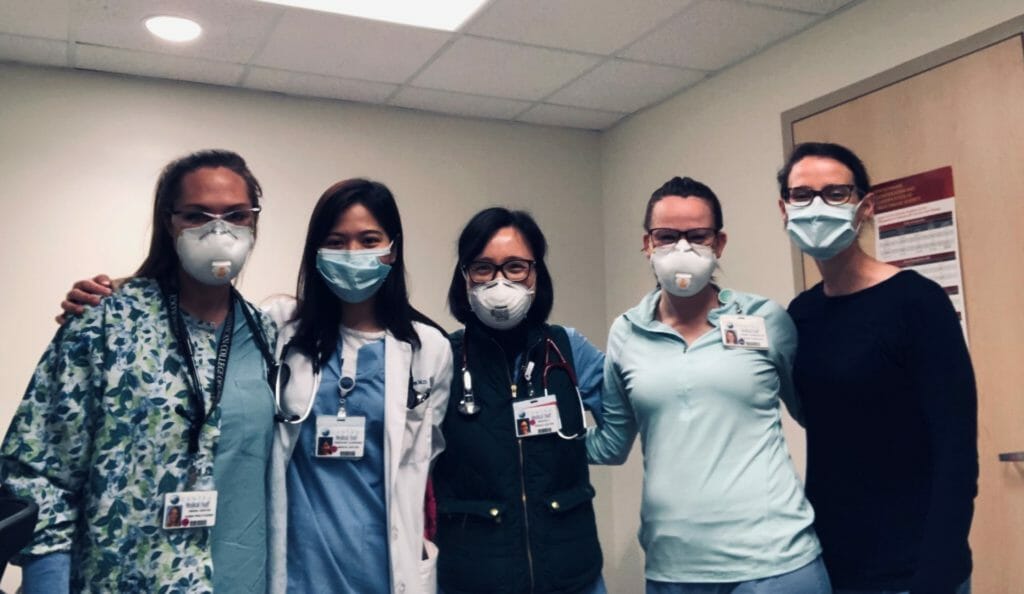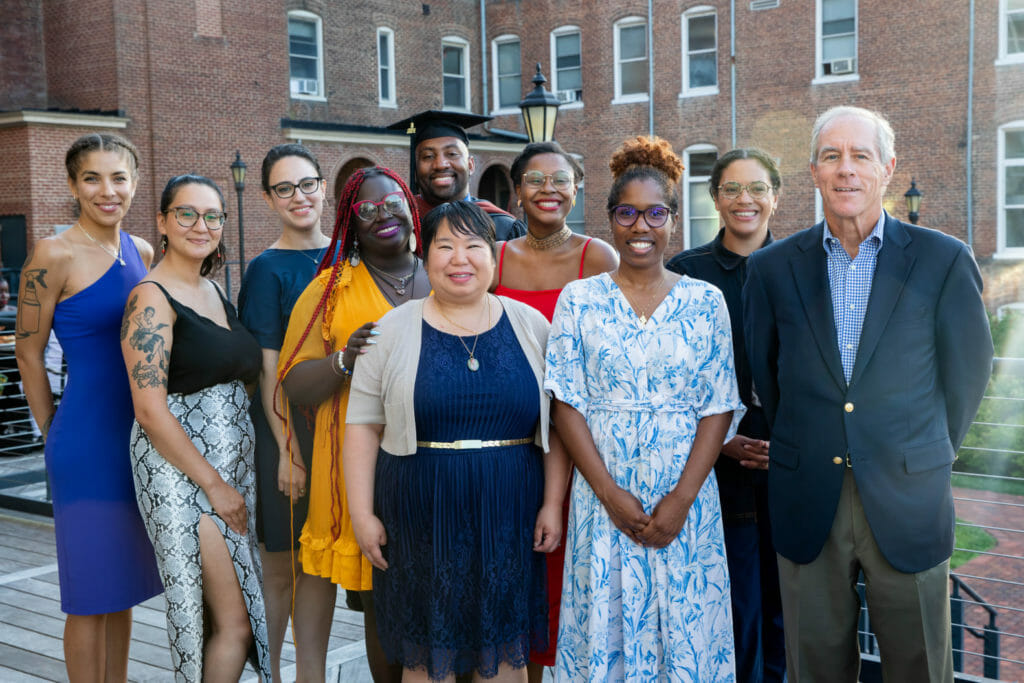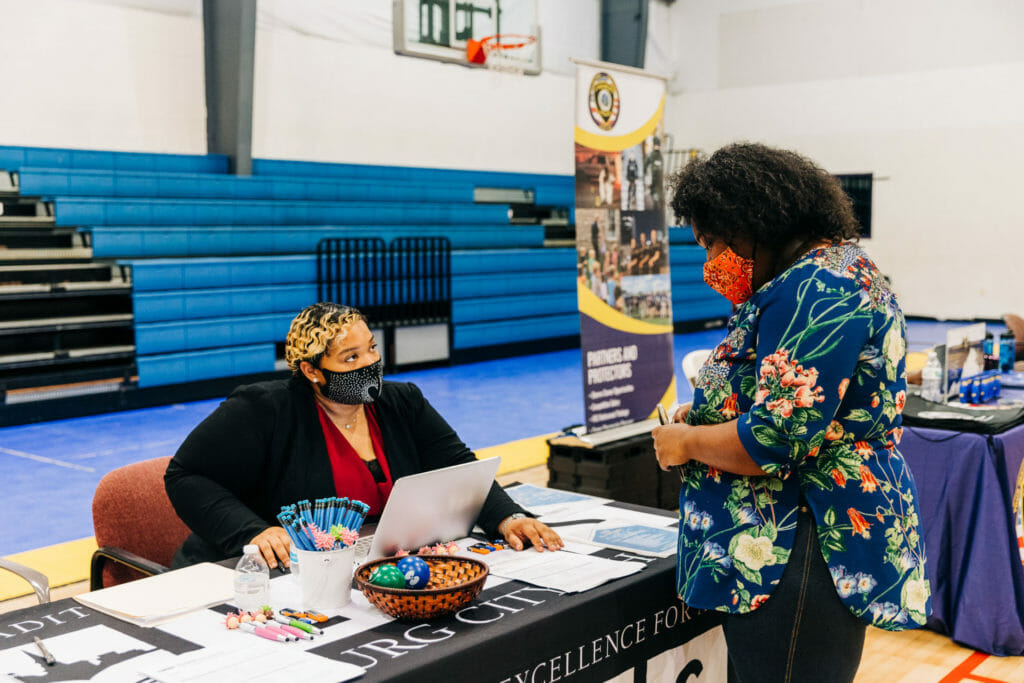Lynchburg companies create cultures of justice, equity, diversity, and inclusion
By Laura Anders Lee

Hill City Pride Festival takes place in Lynchburg each year at Riverfront Park and is sponsored by several Lynchburg companies.
Year after year, Lynchburg is named one of the country’s best places to live and work. While the city is known for its natural beauty and small-town charm, it is also a widely diverse place that seeks to provide an inclusive environment for everyone who lives here.
“We want to promote a sense of belonging and connection for all residents,” says Marjette Upshur, director of the Office of Economic Development & Tourism. “Inclusivity is at the heart of our core values. We understand that successful communities must comprise a diverse group of people with different backgrounds, experiences and perspectives.”
When it comes to creating meaningful and effective justice, equity, diversity and inclusion (JDEI) plans for people of all ages and abilities—regardless of race, gender and sexual orientation—many Lynchburg organizations are leading the charge.
In January 2020, Johnson Health Center launched a robust inclusion and diversity program, and in 2021 the company hired Justin Mercer as its diversity, equity and inclusion (DEI) director. “What made the job super enticing is that even before the events of 2020, my boss, CEO Gary Campbell, had been traveling the country speaking about unconscious bias and planning a DEI program,” says Mercer. “It wasn’t just a quick reaction. He wanted to be part of the solution, not the problem.”
Mercer says the program fits in well with the company’s history and culture. Johnson Health Center was founded in 1998 to provide health care for all, regardless of ability to pay. The facility was named for Lynchburg’s trailblazing African-American physician and tennis coach, Dr. Robert Johnson.
Mercer retains and recruits a diverse team of providers, suppliers and healthcare students to the company, which has 240 employees at eight locations. “If you want to do DEI properly, you have to protect all class groups but also look at neurodiversity—we need to be open to different ways of thinking, too,” he says.
“We’ve made more progress in 12 months than other companies have made in five years,” adds Mercer. “But we’re not moving so fast that there’s not sustainability—you have to be measured in your approach. People have really been on board.”

Centra Cardiologist Unit
The region’s largest health care provider, Centra Health, also has a diversity and inclusion program, intended to “encompass race, age, ethnicity, gender, religion, socioeconomic status, sexual orientation, disabilities, nationality and veteran status.” Centra has partnered with Project SEARCH and Stand Up, Inc., to recruit local students with disabilities for internships. The one-year transition program utilizes this partnership to help students in their senior year successfully integrate into the workforce post-graduation.
“All people have value and can contribute to their community,” says Kelly Reichard, executive director of Stand Up, Inc. “A diverse workforce is beneficial for everyone. People with disabilities are often an untapped population for employers, and it’s important for all people to see people with disabilities contributing to their community in a meaningful way.”
Reichard feels that Lynchburg’s business community overall has been receptive in the hiring and acceptance of all kinds of people. “We tremendously value the Lynchburg community of employers and the support they provide to all people, especially those with disabilities,” says Reichard.

Graduates of the M.F.A. Program at Randolph College. Photo by Randolph College via Facebook.
Named one of “America’s Top Colleges” by Forbes, Randolph College has been breaking barriers since 1891 when it opened as a women’s school. Randolph College became coeducational in 2007 but remains 62 percent female today. Students come from 31 states and 11 countries, and 39 percent are students representing African, African-American, Asian, Black, Indigenous/ Native-American and Latinx/ Hispanic background. Its Office of Diversity, Identity, Culture and Inclusion develops organizational strategy and supports students across every demographic matrix—culture, immigration status, racial category, ethnicity, religion, disability, sexual and gender identity.
“What I have come to understand of the Randolph community, is that there is an unwavering spirit of commitment to justice, and social awareness rolled into academic life,” said Keesha Burke-Henderson, Chief Diversity Officer and Director of Identity, Culture & Inclusion at Randolph College. “As a liberal arts institution firmly rooted in a tradition of a life more abundant for all, we are positioned to heed the current call of righting historic silences and the continuous work of equity management in our operations, academic programs and support services. We are charged to serve the community around us, enhance the community within our walls and build a community poised for our future.”

In August of 2021, the City of Lynchburg held a job fair at the Jubilee Center in Lynchburg.
The City of Lynchburg is also offering inclusivity training to its employees, including a focus on the local LGBTQ/transgender population. Earlier in 2021, the city partnered with the Virginia Center for Inclusive Communities for the training. Through workshops, retreats and programs, VCIC helps raise awareness and provide tools to leaders around the state.
Genworth Financial and Food Lion, both with a strong presence in Lynchburg, were named “Best Places to Work for LGBTQ Equality” in 2021 by the Human Rights Campaign Foundation. Food Lion, with nine grocery stores in the region, was also named a “Best-of-the-Best” company in America by the National LGBT Chamber of Commerce (NGLCC) and the National Business Inclusion Consortium (NBIC).
Genworth Financial employs 750 people in the Lynchburg area. In addition to its inclusion of the LGBTQ community, the company is a Virginia Values Veterans (V3) Certified Company.
“We believe that our people are our strength—and our mission is to create a culture and environment that all of our colleagues, no matter their race, age, ability, gender or affiliation, can benefit from our fair, equitable and inclusive practices,” says Amy Rein, Genworth’s vice president of integrated communications. “Through ongoing learning opportunities, resource sharing and employee resource groups, Genworth is wholeheartedly committed to creating an inclusive work environment where everyone feels safe to be their truest, most authentic self.”
Justice, diversity, equity and inclusivity are good for individuals, for businesses and for the entire community. Different perspectives lead to more innovation, creativity and problem solving while creating a stronger sense of self and of place. When everyone is invited to the table, and when everyone is heard, the whole community prospers.
 Laura Lee is a Virginia-based freelance writer who loves to explore the state with her husband, two boys, and dog, Lillian.
Laura Lee is a Virginia-based freelance writer who loves to explore the state with her husband, two boys, and dog, Lillian.